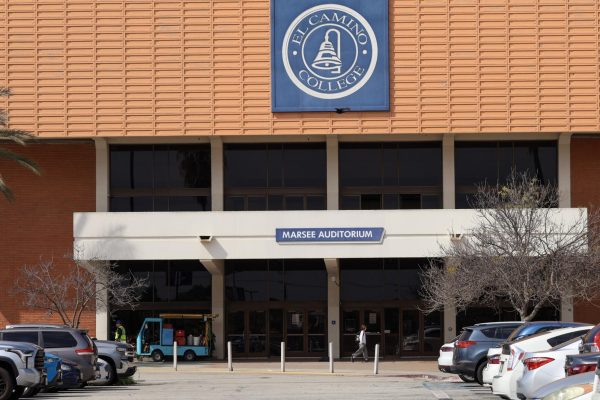A long way to go green: Hurdles to implement recycling efforts at El Camino
El Camino College groundskeeper Daniel Cahill takes a trash container in parking lot K and dumps the mixed waste into a trash compactor provided by Republic Services at the campus facility yard on May 5. All trash is dumped in one compactor and then sorted for recyclable materials by the trash company at a Materials Recovery Facility. (Nindiya Maheswari | The Union)
El Camino College implemented one bin for all types of trash around campus because waste recycling efforts in the past added extra work for employees.
Grounds Supervisor Fernando Vicente said 10 years ago the college tried to recycle and add recycling bins. However, there were problems with the recycling efforts.
Vicente said most people did not care and threw landfill and food scraps into recycling bins.
“We have green bins around campus for paper; half of it, it’s not paper, it’s trash,” Vicente said. “So we cut back on them.”
Vicente added they stopped recycling efforts because it was not a workable situation for the groundskeepers. There are 10 groundskeepers on campus and they can’t spend more time sorting trash.
“We don’t really have a recycling program, except for the cardboard, computer paper and electronics,” Vicente said. “Our trash disposal work here is basically just dumping the trash cans.”
Vicente said El Camino’s groundskeepers take the trash from all-in-one bins to the trash compactor in the facility yard on campus every morning. Then the waste hauler Republic Services comes twice a week to dispose of the trash.
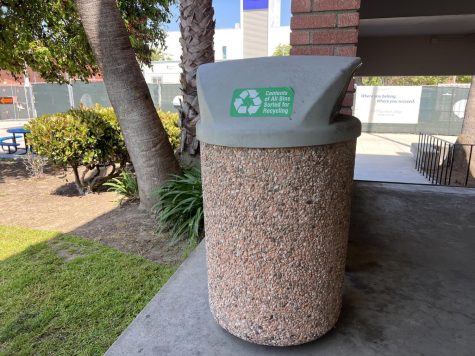
The Union asked for a document of Republic Services’ trash collection fees but El Camino College’s Facilities and Planning Department refused to share the information and the reason was not specified.
“To implement a recycling plan, it will require more employees and probably more equipment,” Vicente said. “It’s not all that easy to do because the facilities department can only do so much with their budget.”
The Union also requested waste management reports from 2020 to 2022, but the Assistant Director of Facilities and Planning Dwight Bradley said he does not have access to the information and that he would look into it more.
Information was not provided by The Union’s May 23 deadline.
Bradley previously worked at the University of Houston and recently joined El Camino College. He said he’d like to see a separation in who manages the trash pick-ups and who maintains the campus grounds.
“I would like to see the grounds crew be a little bit more responsible for just maintaining those spaces,” Bradley said. “And then having a solid waste team, someone who’s dedicated to just going out picking up trash, collecting … throwing it away.”
California Assembly Bill (AB) 341, signed by Gov. Jerry Brown in October 2011, required mandatory recycling for businesses including public education agencies by July 2012, according to CalRecycle.
AB 341 sets a statewide diversion goal of 75% by 2020 for recycling commercial waste but does not mandate a diversion goal for businesses and only requires them to implement a recycling program.
To comply with AB 341, businesses are mandated to separate recyclable materials on-site from the trash before a waste hauler collects them.
However, businesses can also use a trash service that takes mixed waste and separates the recyclables from the trash at a different site. This can be done as long as it yields diversion results comparable to source separation.
El Camino College chose to use the latter method where students and staff throw trash in one bin labeled with “contents of all bins sorted for recycling.”
For comparison, Santa Monica College’s Recycling Program Specialist Kenneth Derieg said the campus has three separate bins for recycling, composting and landfill.
“In some of our hallways and some office buildings, even the paper is separated from the bottles and cans,” Derieg said.
Derieg added the two separate recycling bins end up together in the same recycling dumpster at the end of the day. However, it’s an effort to prevent liquid from soda cans from spilling out and making the paper wet, according to Derieg.
Santa Monica College uses Athens’ trash service to pick up their trash. Derieg said they have a specific dumpster where they throw their landscaping waste and the organic bin gets picked up by Athens.
The college also has a sustainability center that composts on-site for food waste collected from their food pantry and campus dining.
Santa Monica College Sustainability Manager Ferris Kawar said in an email the budget to pay the trash company that picks up separate waste bins comes from the district fund and Associated Students’ fund.
In contrast to Santa Monica College, El Camino College Associated Students Organization (ASO) Senator of Mathematics Rebecca Gloyer has been working with student government members and Student Leadership Institute participants on sustainable waste management initiatives since the spring of 2022.
Despite receiving support from faculty, Gloyer said one of the challenges to implementing the initiatives is the money.
“We can’t really allocate too much of our finances to sustainability because ironically it’s not sustainable financially for us as an institution, which is very sad,” Gloyer said.
Gloyer said the college administration is supportive of the idea but does not have the funds set aside for an extreme change in waste management.
Gloyer added throwing all trash in a mixed-waste bin makes it difficult to educate our students.
“If they’re being like conditioned to throw everything all forms of waste into one container, they’re not going to be used to the different forms of waste,” Gloyer said. “A lot of people don’t know what is actually recyclable with actually compostable.”
To educate students on sustainable waste management, ASO plans to host recycling and composting workshops and seminars in the fall 2023 and spring 2024 semesters.
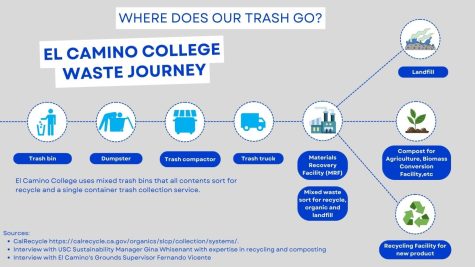
While throwing all kinds of trash into one bin is not against the law, this practice poses a risk of contamination of the recyclable materials which end up getting trashed, according to USC Sustainability Manager Gina Whisenant, an expert in recycling and composting waste.
“When it’s contaminated, it’s already compromised the materials,” Whisenant said. “They can no longer take them apart and recycle them and make them into something new.”
Whisenant said trash haulers send mixed waste to “dirty” Materials Recovery Facilities (MRF) where they will pull recyclables out of it.
“They are pulling more of like water bottles, definitely not papers because papers are probably contaminated at that point,” Whisenant said.
On the other hand, if the recyclable materials have been separated previously, the recyclables will go to a clean facility. Whisenant said the recycling success rate in a dirty facility is not as high as in a clean facility.
Whisenant said Los Angeles cities that fall under the LA City Franchise do not accept a dirty Materials Recovery Facility so they have to use separate trucks to take the trash from recycling, composting and landfill bins. Their waste collection goes to a clean facility as they do not sort it from the mixed trash.
However, El Camino College does not fall under the LA City Franchise and the college still complies with AB 341 by putting recycling responsibility mostly into the trash company instead of the campus.
Whisenant said the U.S. has about 30 to 35% of food waste in landfill. She said it’s important to get food waste out of the landfill because it releases methane which is more toxic than carbon dioxide.
“If we don’t do it right and I think the obvious is that we continue to pollute the planet,” Whisenant said. “If we get food into the landfill then we are releasing methane, which is very potent and dangerous.”


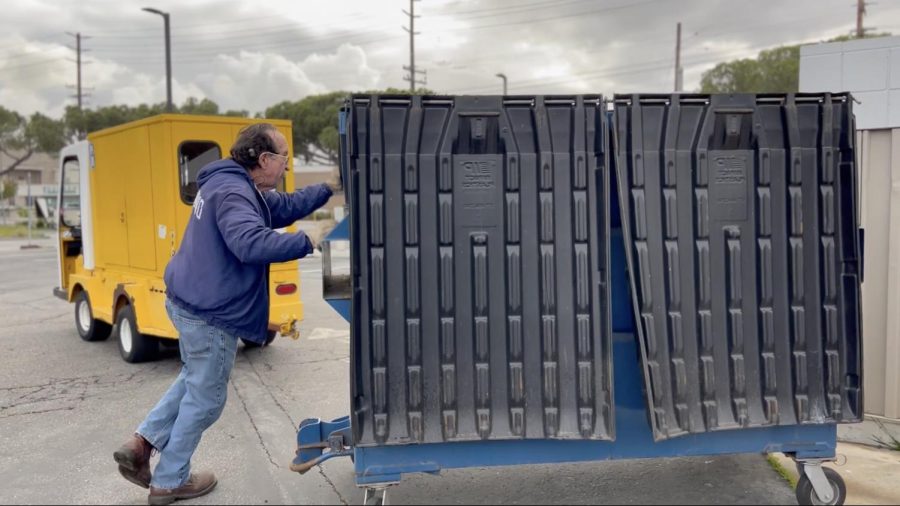
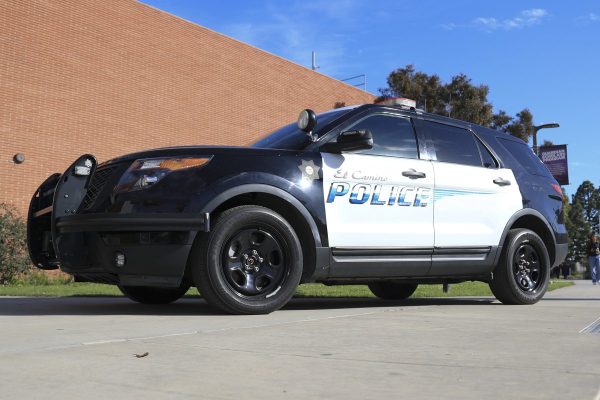
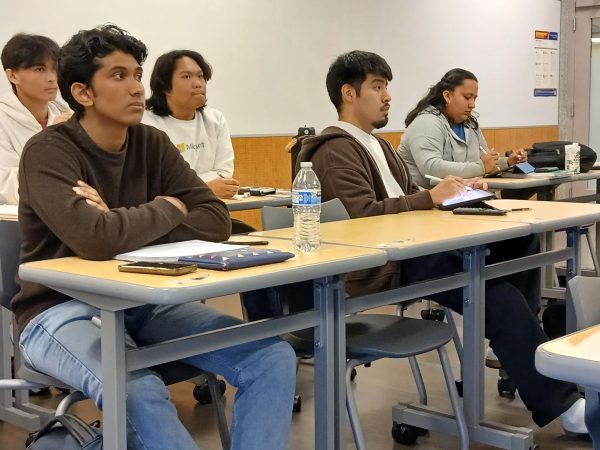
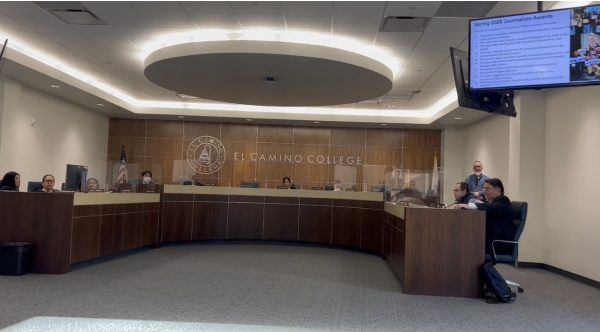
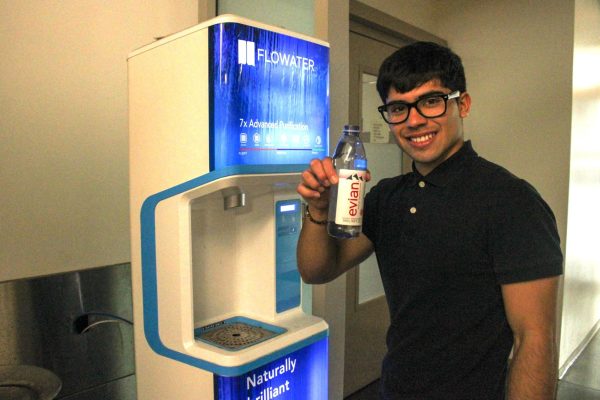
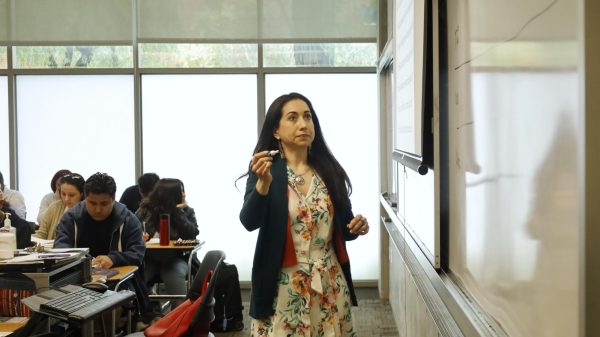
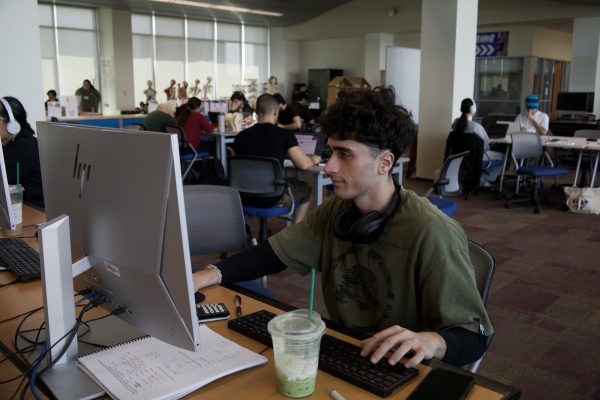
![Physics and astronomy professor Susan Stolovy presents astronomical news and updates to attendees at the first planetarium show of the semester at El Camino College on Friday, March 28. Prior to becoming a professor at ECC, Stolovy completed her doctorate in physics and worked as an astrophysicist for NASA and the California Institute of Technology on spacecraft missions. "[I'm] still very tuned into what's going on in the world of research as well, and I hope to bring a little bit of my experience into the classroom," Stolovy said. (Nikki Yunker | The Union)](https://eccunion.com/wp-content/uploads/2025/03/planetarium-Made-with-Clipchamp-3-frame-at-0m28s-600x338.jpg)
